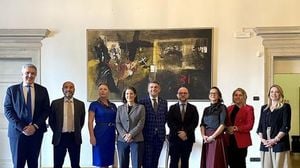Recent claims involving Israeli Prime Minister Benjamin Netanyahu have made headlines, particularly surrounding alleged statements he made about the United States. The controversy centers on supposed remarks where Netanyahu was quoted saying, "America is a golden calf and we will suck it dry, chop it up, and sell it off piece by piece until there is nothing left but the world’s biggest welfare state..."
This alleged quote surfaced again more recently, raising suspicions among fact-checkers and general audiences alike. The claim itself traces back to 1990, well before Netanyahu assumed the Israeli premiership, indicating potential exaggeration or misrepresentation of his actual words.
Netanyahu's alleged statement has been continuously circulated on social media platforms, especially since 2017. Some memes presenting the quote have attempted to depict Netanyahu as invoking nefarious strategies against the United States.
Fact-checkers have been quick to label the statement as "unfounded" following thorough investigations. The original source of this quote frequently led back to the website Veterans Today, known for propagandizing conspiracy theories and having previously spread antisemitic content.
Specific criticisms of Veterans Today also came to the surface during the investigation. It's been noted multiple times by analysts and researchers as credible for pushing false narratives and unverified articles.
Veterans Today's senior editor, Gordon Duff, stated on record about the mixed nature of their content, noting, "About 30% of what's written is patently false. About 40% of what I write is at least purposely, partially false, because if I didn’t write false information, I wouldn’t be alive."
While this confession raises alarm bells over the integrity of the site, it also questions the reliability of the content attributed to prominent figures like Netanyahu. The quote, as circulated, claims to come from Netanyahu's remarks made during covert conversations held at Fink's Bar, which was known as a hub for operatives.
Despite the dramatic assertion, no actual recording or transcript has been provided by those promoting this narrative. Skepticism about the existence of any such evidence has only grown, with fact-checkers concluding the claims remain baseless.
Meanwhile, the backlash continues from various branches of the media and public figures, emphasizing the dangers of misinformation. Claims involving such high-profile political figures can have far-reaching consequences, affecting diplomatic relations and public opinion.
Fact-checking entities have also focused on the societal impact of spreading such rumors. They stress the significance of challenging narratives, especially those surrounding geopolitical relationships.
Pairing this story with another emergent issue, Türkiye has also expressed outrage at allegations made by Israeli Foreign Minister Israel Katz. Katz suggested via social media posts about alleged financial matters concerning Ismail Haniyeh, the deceased Hamas leader.
The Turkish government has countered these claims vigorously, asserting they were fabricated. They issued statements reaffirming no verified financial dealings were pertinent to Haniyeh within Turkish financial systems.
Türkiye's Presidential Communications Directorate emphatically rejected Katz's assertions, outlining the falsehood of claims surrounding any supposed wealth management once held by Haniyeh. They emphasized how these remarks were supposedly intended to distract from wider humanitarian issues stemming from Israel’s actions.
According to Turkish officials, these misleading assertions seek to shift global focus away from the realities faced by Palestinians. With the death toll exceeding 40,000 amid the conflict, there has been mounting global concern over the humanitarian crisis.
Critics assert Netanyahu's administration continues misinformation tactics similar to those utilized by Katz. With escalating wars of words between Ankara and Tel Aviv, public perceptions are shifting, and media scrutiny has intensified.
The Turkish Foreign Ministry labeled Katz's statements as slander, emphasizing the intent behind them. Alongside their denial of the financial claims, they reiterated their commitment to the Palestinian cause.
President Erdoğan has not held back either, promising unwavering support for the Palestinian people. He criticized Israeli policies for their humanitarian consequences and labeled them as atrocities against innocent civilians.
While both Netanyahu and Katz's statements have created substantial international scrutiny, Türkiye's stance remains steadfast. The country utilizes these incidents to highlight its humanitarian prerogatives and maintain its diplomatic position.
Recent actions reflect broader tensions between Türkiye and Israel, which have drastically worsened since hostilities began. Government relations have soured, with Ankara severing commercial ties and taking strong diplomatic stances against Israeli actions.
Israel now faces allegations of genocide poised at international courts, supported by Turkish advocacy. The growing number of multifaceted geopolitical tensions illustrates how misinformation can exacerbate longstanding issues.
The intertwining narratives surrounding Netanyahu, Haniyeh, and Katz serve as reminders of how complicated international relations can become. Critical evaluations of statements made by public officials are necessary to cut through the noise of misinformation and conjecture.
Both cases bring forth the dire need for fact-checking entities, as they play pivotal roles in ensuring the public is accurately informed. Clarity amid political heavyweights’ statements matters greatly for fostering truth over speculation.
Moving forward, the importance of scrutinizing facts and addressing misinformation is more critical than ever. The global political stage is often fraught with agendas, and staying informed can be the key to discerning reality from hyperbolic narratives.
Consequently, both the scandal surrounding Netanyahu's alleged words and Türkiye's response highlight the pressing need for transparency and accountability. Significant political ramifications await those who misuse their platforms to spread misleading narratives.
Both cases underscore the necessity for continuous dialogues on integrity within communications and the influence of leaders. The pursuit of truth within any political discourse should prevail over sensationalism and unfounded narratives.
So, as the dust settles on these allegations and counter-allegations, the interplay of fact and fiction continues to shape our geopolitical landscapes.



